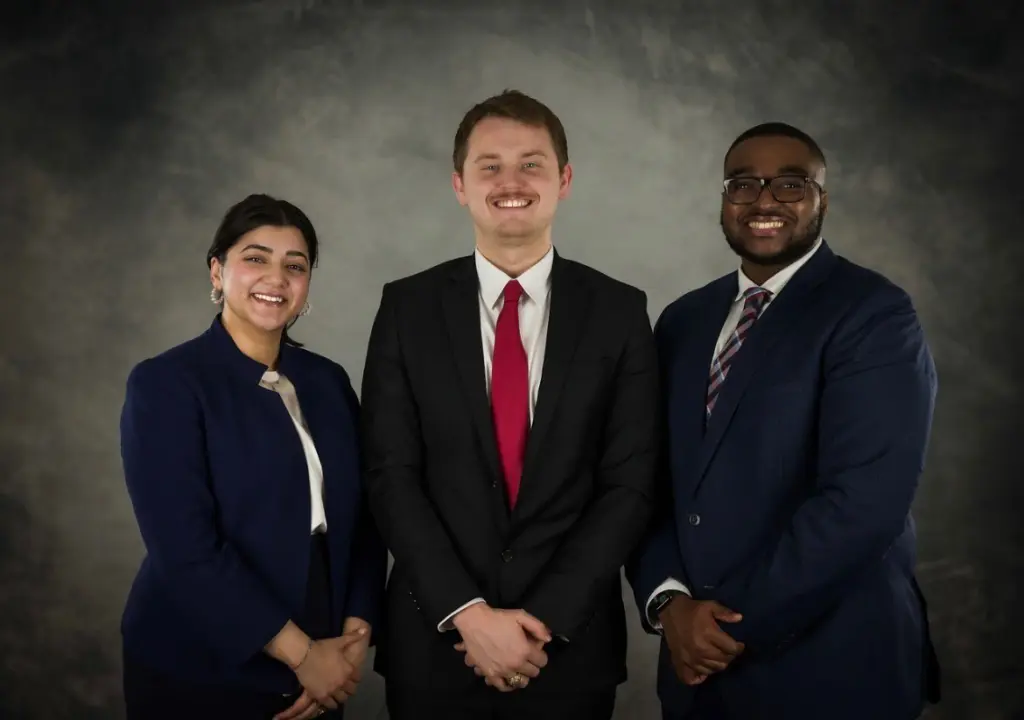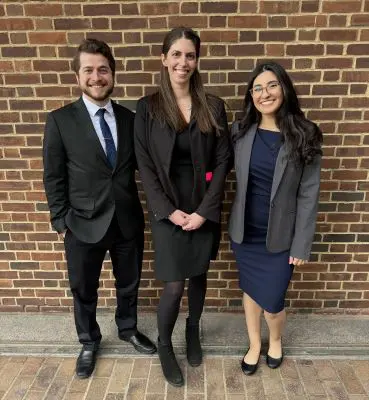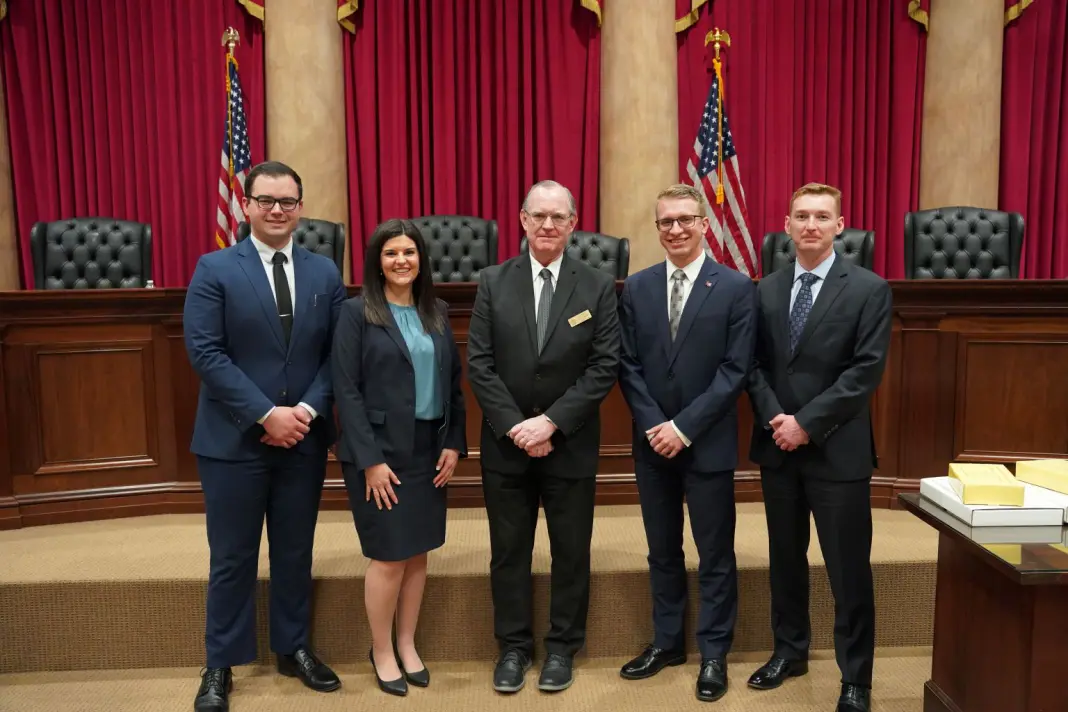Last year, Memona Niazi from South Texas College of Law Houston won the First Chair Mock Trial Competition in San Diego and the Seigenthaler-Sutherland Cup First Amendment Moot Court Competition in Washington, D.C.
But she said that sometimes losses at competitions are more memorable than wins, because it provides motivation to get better.
“At the end of the day, I’m making mistakes or I’m learning lessons now so that in the future for my clients, that doesn’t happen,” Niazi said. “These competitions help show the kind of lawyer I’d want to be.”
The days when she had a bad round or two? She didn’t get down on herself.
“I didn’t give up,” she said. “And I think it helps build that endurance, that stamina, that grit.”
South Texas Law has a history of being one of the top schools for advocacy, taking the top spot in 2017 and 2018 by the University of Houston Law Center’s Blakely Advocacy Institute. The institute compiles its rankings by tracking the performance of schools across the country in moot court competitions, Best Brief awards and Best Oral Advocate.
South Texas Law placed third in the 2024-2025 moot court rankings, which was a significant move up the list from last year.
“Our students train hard not just to win competitions and add to the school’s legacy, but to enter the legal field with the skills, experience and confidence to contribute to and win cases from day one,” said Rob Galloway, vice president of advocacy at South Texas Law. “This ‘practice-ready’ approach has been and will remain the cornerstone of a South Texas Law education.”
Michigan State University School of Law maintained its position at number one, NYU Law School moved up two spots from last year to take second place, and Baylor University Law School also maintained its position, ranking fifth once again.
Jennifer Copland, associate clinical professor of law and director of the competitions program at MSU Law, said this is the third time in six years that the school has topped Houston’s ranking charts.
“Our program has undergone a number of changes over the past decade including the creation of a student-led Board of Advocates,” Copland said, “Our student BOA leaders have gone above and beyond the past few years to ramp up excitement and provide competitive and mentoring support to all of our teams.”
Liberty University School of Law also made a huge jump from 19th place last year to take fourth place.
“We had a phenomenal year this year,” said Scott Thompson, director of the Center for Lawyering Skills at Liberty Law. “It’s certainly not NCAA Football, but among law schools, it’s one of the premier co-curricular activities you can compete in and so there’s already pressure on them to compete and excel. They want to do their best. They chose to compete in this kind of an activity because they’re very highly motivated.”
Moot court is a special breed of law school activity because it’s the closest analogue to actual law practice during the three-year process. The difference is that it allows students to refine the art of arguing a case without having to worry about real-world consequences.

Process, process, process
Galloway said that real world conditions during the preparation phase are always going to be the best way to prepare students. He credits South Texas Law’s success with their use of alumni that come back and put students through the paces, a process which is even easier now thanks to Zoom and other video calling services.
“That’s our secret weapon,” he said. “We have loyal alumni who’ve been in that same position and pay it forward and serve as judges for us as we prepare our students for the competition.”
Another key strategy of theirs is to simulate the tournament conditions two weeks before the actual competition so that students can understand the rigors of the process and how tired they’re going to be after arguing multiple rounds in a day.
“We do it so they can appreciate that they need to get their sleep and be ready to perform at the highest level when it counts,” Galloway said.
Similarly, Liberty Law spends a lot of time teaching the students basic skills.
“We have focused on skills competitions from day one,” Thompson said. “We have made this one of the focal points of the law school, to develop skills in our students so that when they graduate and go out there and are actually practicing law, they know a little bit about what it actually looks like.”
Moot court is a co-curricular activity at Liberty Law, with students earning one credit hour per semester during any semester in which they compete. Each credit hour is the result of, at minimum, 80 hours writing, polishing and preparing a brief. Additionally, there are 10 organized practices throughout the semester where students spend an hour with the coaches, and then at least 60 hours of individual oral argument practice.
“They’re putting in a whole lot of time just to get one credit hour that counts toward graduation,” Thompson said. “They do it to hone their skills and because they love competition.”
MSU Law requires any student participating in moot court to take a fall competition class where they write and argue as teams and then compete in an internal competition.
“This not only provides experience to help students get over their nerves, but it also gives us the chance to provide extensive competitive training and feedback before they represent MSU Law at national competition,” Copland said.
Using moot court to get over their nerves is a common thread among all the top-ranking schools.

“You have to confront that paralyzing emotion and just do it,” Galloway said. “When you work past the paralyzing fear that a lot of students have about speaking in public, you get them into lawyer mode and that’s really when it can make a difference.”
Online vs. offline
Hybrid competitions have been part of the game ever since COVID, but most competitions will likely remain in-person, though some schools will continue with online formats. Feelings are split between the two formats, because each offers its own set of advantages and disadvantages.
“Students overwhelmingly prefer to have the travel experience, but we have continued sponsoring teams in virtual competitions as well because it allows us to provide more opportunities to more students at a low cost,” Copland said.
Galloway echoed the importance of the in-person experience but also noted that more and more actual courtrooms have begun allowing proceedings to take place over Zoom, and knowing how to navigate a virtual proceeding is a different skill than doing it in person.
“If you’re in the same room with somebody, there are different verbal cues that you can get and a lot of the energy that you get as an advocate from the body language of the person you’re arguing to, but if you are purely online, it’s harder to read a person,” he said. “It is a bit different to persuade in person, as opposed to persuading online, and a truly well-rounded advocate needs to develop both.”
This article appears in the 2025 Back to School issue of preLaw Magazine.


